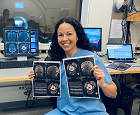Trainee BoardIMBES is also very pleased to have a Trainee Board. Sylvia Gattas and Kristin Simmers serve as the co-trainee representatives to the IMBES Board and co-presidents of the IMBES Trainee Board. In these roles they articulate a vision for the trainee board and manage it, liaise between the Trainee Board and the main IMBES board, serve as the voice for the trainee community, and promote the interests and engagement of trainees. |
Co-President
Sylvia Gattas
| Sylvia Gattas is a final year DPhil candidate, studying under Professor Gaia Scerif and Dr. Alexandra Hendry. She’s interested in early cognitive development, specifically the interplay between affect, attention, executive functions, and early numeracy. How children develop their affective regulation is at the forefront of her research, along with how they develop their number sense and the influence of affect on their attentional and executive processes foundational to maths development. She hopes to use innovative approaches to guide her research and eventually apply findings to improving education and how we consider children's mental health during their educational development. It's her long-term goal to ensure that the bridge between research and education is strengthened through collaborations between researchers, innovators, educators and policy makers. |
Co-President
Kristin (Kris) Simmers
| Kristin Simmers is a PhD student studying Learning Sciences at the University of Connecticut. Her research interests include MBE in teacher preparation and bidirectional teacher-researcher partnerships. Kristin holds an M.S. in Elementary Education, an M.Ed. in Curriculum and Instruction, and a graduate certificate in Special Education. She taught for 16 years in 4 countries and continues to work directly with teachers and administrators interested in research-informed practice. Her interest in the brain and learning began in 2000 as her younger brother began to struggle in school, and his experience continues to motivate her work in this field. |
Secretary
Virany Men
| Virany Men is a Master’s student in the School Psychology program at the University of Oregon. Prior to beginning her graduate studies, she was a research coordinator on two grants: one exploring brain regions in at-risk first graders associated with response to early math intervention and the second exploring brain patterns in children with developmental delays and autism spectrum disorder. Formerly, she was a Research Associate Intern at an Education Policy non-profit providing support with managing datasets and developing resources for practitioners and public policy makers. She is currently practicing as a School Psychologist in Oregon. |
Research Chair
Liz Contreras
| Liz Contreras is a graduate student at the Harvard Graduate School of Education. She is a first-generation, Indigenous Latina student in the Human Development & Education Program. Liz received her undergraduate degree with Honors in Neuroscience, with a minor in Chicano Studies. She is interested in addressing the effects of intergenerational trauma on the brain and learning. Liz looks forward to making sure that BIPOC voices are continuously uplifted within K-12, higher education, and academia. She believes in building more inclusive spaces that lead to intersectional, innovative, and paradigm-shifting ideas. |
Policy and Practice Chair
Sarah Gilmore
| Sarah Gilmore is a former K-8 teacher with 15 years of experience and a Masters in Educational Leadership and Management, turned Ph.D. student in the Learning Sciences program at the University of Connecticut. Sarah has a background in educational technology integration and transdisciplinary, concept-based curriculum and instruction, and in supporting teachers’ access to research and evidence-based practice through online workshops, courses, and podcasting. Sarah’s current research is focused on attention in science learning contexts, and facilitating equitable and accessible teacher learning and research-engagement through technology. |
Social Media Chair
Floor Vandecruys
| Floor Vandecruys is a PhD student at the Parenting and Special Education Research Unit of the University of Leuven (Belgium), working with Prof. Dr. Bert De Smedt and Prof. Dr. Maaike Vandermosten. Her research interests include studying experience-dependent neuroplasticity in early childhood and overlap between reading and arithmetic. Floor’s current research is focused on how formal schooling affects brain networks that are important for early academic skills. With her background as a speech-language pathologist, she aspires to tackle the ‘dyslexia-paradox’, by focusing specifically on kindergartners and early risk factors. |
Past President
Kathryn Devries
| Kathryn deVries is currently completing her doctorate at Temple University. Her research interest is studying the use of heart rate variability (HRV) in the classroom to identify students who are struggling with physiological, emotional, and cognitive integration due to adverse childhood events (ACEs). She performed a pilot study with college students using exercise watches to examine HRV in and outside of math class in 2019-2020 which is in preparation. Kathryn is currently working on a similar study with 4th and 5th graders for her dissertation. She is also a licensed professional counselor with a specialty in trauma. Kathryn has studied the Neurosequential Model of Therapeutics (NMT) with the Child Trauma Academy led by Dr. Bruce Perry. |







